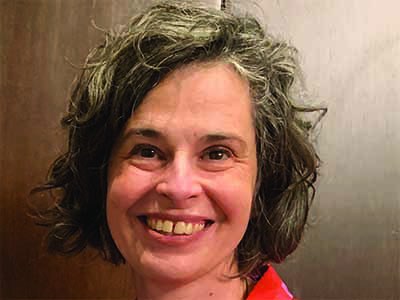
Kate Holbrook. Photo courtesy Laurie F. Maffly-Kipp
Kate Holbrook, a leading scholar on the history of Latter-day Saint women, died on August 20, 2022, of eye cancer. Since 2011, she had served as managing historian for women’s history for the Church History Department of the Church of Jesus Christ of Latter-day Saints (LDS) in Salt Lake City. In her final year, she was appointed as the department’s inaugural academic collaborations coordinator, where she worked to connect and collaborate with academic researchers, programs, and institutions.
Holbrook was born in 1972 in Santa Barbara, California, to Kathleen Stewart and Robert Holbrook. Raised in Provo, Utah, Kate received her bachelor’s in English and Russian literature from Brigham Young University; a master’s in theological studies from Harvard Divinity School; and a doctorate in religious studies from Boston University, where she studied comparative religion and foodways. Her work on Mormon women’s history followed naturally from her interests in both cooking and religion, as well as everyday ways that faith is expressed in community life.
Holbrook’s scholarly output was prodigious and covered a wide range of topics. She was the co-editor of foundational texts in LDS women’s history, including The First Fifty Years of Relief Society: Key Documents in Latter-day Saint Women’s History (Church Historian’s Press, 2016); Women and Mormonism: Historical and Contemporary Perspectives (Univ. of Utah Press, 2016); and At the Pulpit: 185 Years of Discourses by Latter-day Saint Women (Church Historian’s Press, 2017). She also oversaw the online publication of The Diaries of Emmeline B. Wells, a crucial figure in late 19th- and early 20th-century Mormonism. Her work with documents from the LDS Church archives afforded her a vantage on women’s experiences that she used to extraordinary effect, surfacing voices that had long been excluded from institutional histories.
Holbrook also had numerous loves alongside her scholarship, hobbies that she approached as an educator and someone who enjoyed sharing her discoveries. She loved to cook, a passion that resulted in a cooking blog, The Away Café. She authored numerous articles about LDS women’s culinary traditions and delivered incisive and entertaining talks about Jell-O, among other memorable delights. At the Church History Library, she created the tradition of an annual women’s history luncheon, a ritual that made use of her multiple skills.
One of her mentors, Laurel Thatcher Ulrich, noted that Holbrook was a natural bridge builder, mediating between historical perspectives of professional scholars and church leaders, members of other religious communities, and students and senior faculty. As Ulrich put it, she radiated “grace and wisdom” in every setting. Others commented on her incisive intellect, generosity, and deep kindness. According to a former student, Holbrook “had a true gift for highlighting the beautiful and unique characteristics in other people’s lives.” Even as Kate’s energy was failing, she continued her work and displayed her care for others in everything she did.
Holbrook was a beloved colleague and mentor to many. I had the good fortune of working closely with her over the last four years on the Mormon Women’s History Consultation. Together we gathered a talented and diverse group of 14 scholars. We mentored them in their research and writing, yes. More than that, Kate nourished them. Just as she understood the importance of good food to fellowship and community, she knew that the best scholarship comes when we are fed physically, emotionally, and intellectually. At our first gathering in 2019, she and her family cooked a lovely Indian meal for us, a gesture that set the tone for the years to come. At our yearly meetings, she always managed to find delicious food and foster discussions that ranged well beyond the details of scholarly research. She was a marvelous teacher because she understood that the best kind of support one can offer is the sharing of oneself. She nourished us all through the gift of her luminous, funny, intelligent self.
The philosopher Seneca once said, “Wherever there is a human being, there is an opportunity for a kindness.” No one lived that precept more fully than Kate Holbrook. Those who knew her were well nourished but left wanting even more.
Laurie F. Maffly-Kipp
Washington University in St. Louis
This work is licensed under a Creative Commons Attribution-NonCommercial-NoDerivatives 4.0 International License. Attribution must provide author name, article title, Perspectives on History, date of publication, and a link to this page. This license applies only to the article, not to text or images used here by permission.